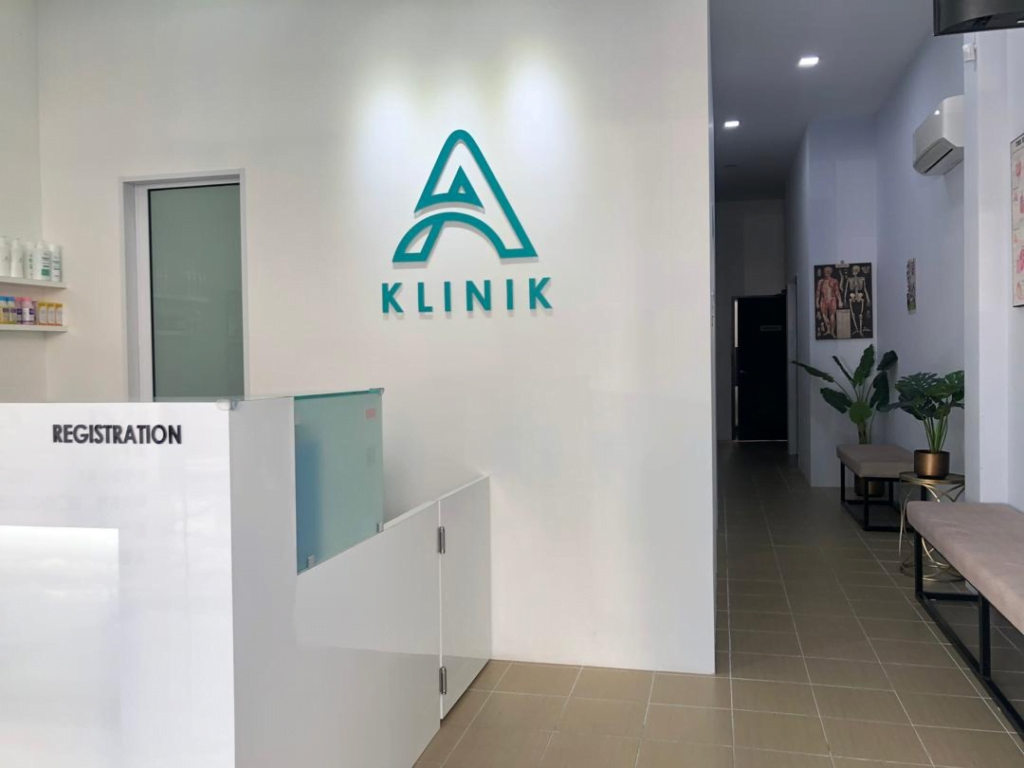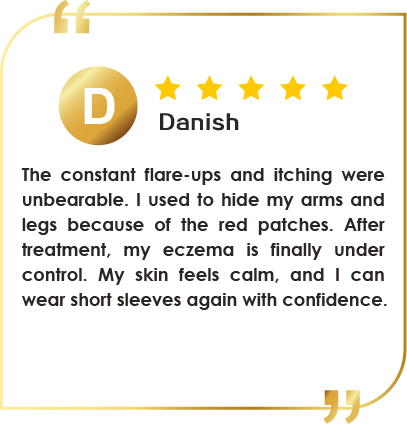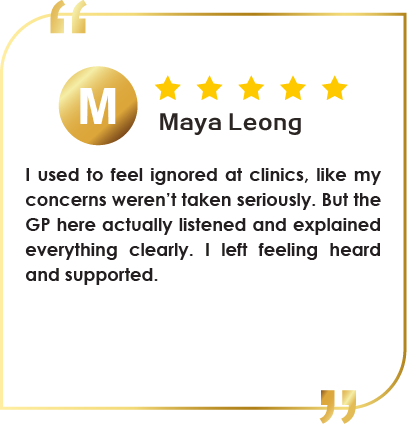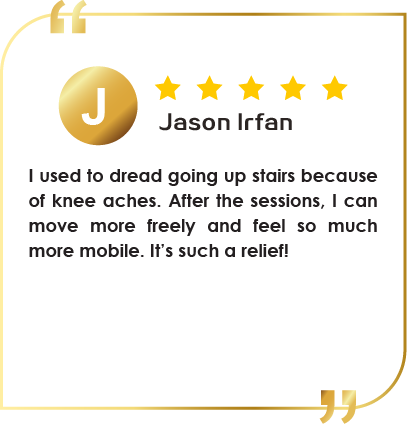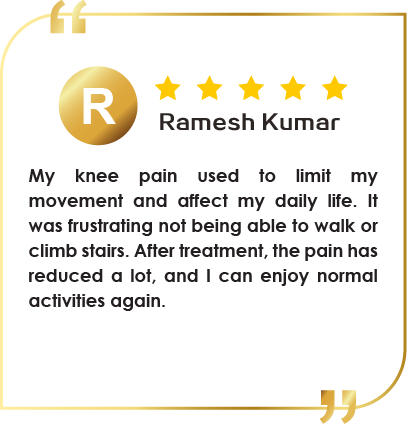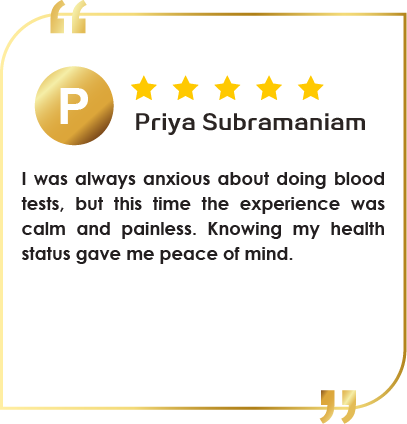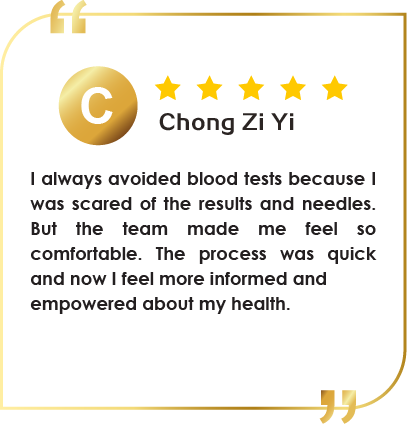Knee PRP Therapy in KL & Penang
Knee PRP Therapy
What is Knee PRP Therapy?
Knee PRP Therapy, also known as platelet-rich plasma therapy, is a revolutionary regenerative treatment that utilizes your own blood to promote healing in the injured knee joint. Platelets are tiny cell fragments found in your blood that play a vital role in clotting and tissue repair. They contain numerous growth factors, which are signaling molecules that stimulate various cellular processes crucial for healing.
Once injected, the growth factors in the PRP get to work. They signal to surrounding cells, including stem cells, to initiate a cascade of healing processes. This includes stimulating the growth and multiplication of healthy cells in the injured tissues, increased production of collagen for tissue repair and reduced inflammation.
Benefits of Knee PRP Therapy for Knee Pain
Promotes Healing: PRP injections stimulate the healing process by attracting healthy cells to the injured area and encouraging tissue regeneration in damaged cartilage, tendons, or ligaments.
Reduces Pain: As healing progresses, inflammation and pain associated with the injury are often significantly reduced.
Minimally Invasive: PRP therapy avoids the risks and recovery time associated with surgery. This treatment leverages your body’s own healing mechanisms, minimizing the need for medications.
Faster Recovery: PRP therapy can potentially accelerate healing time compared to traditional treatment methods.
Who Can Benefit from Knee PRP Therapy?
Knee PRP therapy can be a valuable option for individuals with various knee conditions, including:
- Osteoarthritis: Early-stage osteoarthritis where cartilage breakdown has begun.
- Ligament Sprains: To promote healing and recovery after ligament injuries.
- Tendonitis: Inflammation of the tendons surrounding the knee joint.
- Meniscus Tears: To support healing of small meniscus tears.
It’s important to remember that PRP therapy is not a one-size-fits-all solution. A doctor will evaluate your individual condition to determine if you’re a suitable candidate before the treatment could be considered. While results can be promising, PRP therapy is a relatively new treatment, and long-term data is still emerging.
Risk Factors of Knee Pain
Knee pain can affect people of all ages and activity levels. However, certain factors can increase your risk of developing knee problems. Conditions like rheumatoid arthritis, gout, and inflammatory bowel disease can also contribute to knee pain.
Age
As we age, the cartilage in our knee joints naturally breaks down, making them more susceptible to wear and tear. This is a major risk factor for osteoarthritis.
Injuries
Previous knee injuries, particularly ligament tears, meniscus tears, and fractures, can significantly increase your risk of future knee pain and osteoarthritis.
Weight
Carrying excess weight puts additional stress on your knee joints, increasing the risk of pain and injuries
Repetitive Strain
Activities that involve repetitive movements that stress the knee joint, such as running, jumping sports, or certain physically demanding jobs, can contribute to knee pain over time.
Muscle Weakness
Weak or imbalanced muscles around the knee joint can lead to improper tracking and increased stress on the joint, increasing the risk of pain.
Leg Alignment Issues
Improper leg alignment, such as flat feet or knock knees, can alter the way weight is distributed across the knee joint, leading to pain and uneven wear on the cartilage.
When To See a Doctor for My Knee Pain
While some knee pain can be managed with home remedies and lifestyle changes, there are situations where seeking professional medical attention is crucial. Here are some signs that indicate it’s time to see a doctor for your knee pain:
- The pain is severe and interferes with daily activities: If the pain is so intense that it makes it difficult to walk, climb stairs, or perform everyday tasks.
- The pain is persistent and lasts for more than a few days: Acute pain that arises after a specific injury may subside within a few days. However, if the pain persists for more than a week or two, especially with no clear cause, it’s important to see a doctor for diagnosis and treatment.
- Swelling or redness around the knee: Significant swelling or redness around the knee joint can indicate inflammation or injury, and requires medical evaluation.
- Instability or buckling of the knee: Feeling like your knee might buckle or give way when walking or putting weight on it is a red flag and requires a doctor’s assessment.
- Loss of range of motion: If you experience a significant decrease in your knee’s ability to bend or straighten, seeking medical advice is essential.
- Fever: If you experience knee pain along with a fever, it could be a sign of an infection, requiring immediate medical attention.
Early diagnosis and treatment are crucial for managing knee pain effectively and preventing further complications. If you experience any of the above signs, don’t hesitate to schedule an appointment with your doctor or a knee specialist.
How it works
The Knee PRP Therapy Process
Step 1
Blood Draw
A small amount of your blood, typically around 10-20 teaspoons, is drawn from your arm. You’ll only feel a little pinch.
Step 2
Platelet Concentration
The blood is processed to concentrate the platelets, which are rich in growth factors that promote cell regeneration and healing.
Step 3
Injection
The concentrated platelet-rich plasma (PRP) is then injected back into the injured area in your knee joint.

Why Choose us
The Best Clinical Experience
We believe in a patient-centered approach to healthcare. This means we take the time to listen to your concerns, understand your medical history, and work with you to develop a treatment plan that aligns with your individual needs and goals.
We uphold the highest standards of safety in all our treatments, ensuring that every procedure is conducted with utmost care and precision
Get transformative results with our advanced treatment modalities and techniques.
We listen to concerns, understand your goals, and tailor our treatments to meet your specific needs.
A Trusted Medical Clinic in KL & Penang
A Klinik Penang
Don’t let knee pain hold you back! With our doctors and personalized approach, we can help you regain mobility and help you recover to a more active and healthy life. To schedule an appointment or learn more about our services, contact us today!
